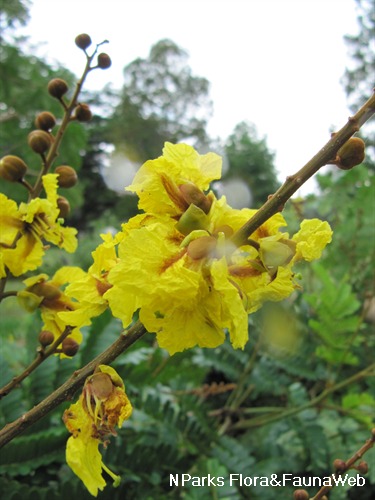
Back
Peltophorum pterocarpum (DC.) Backer ex K.Heyne
| Family Name: | Fabaceae (Leguminosae) |
| Common Name: | Yellow Flame, Jemerlang Laut, Yellow Flamboyant, Jamerelang, Balai, Batai, Batai Laut, Yellow Poinciana, Copper Pod, Rusty Shield Bearer, Rusty-shield Tree, 盾柱木, 黄盾柱木, 双翼豆, 翼果盾柱木 |
Name
Classifications and Characteristics
| Plant Division | Angiosperms (Flowering Seed Plants) (Dicotyledon) |
|---|---|
| Plant Growth Form | Tree |
| Lifespan (in Singapore) | Perennial |
| Mode of Nutrition | Autotrophic |
| Plant Shape | Umbrella |
| Maximum Height | 35 m |
| Maximum Plant Spread / Crown Width | 9 m to 12 m |
| Tree or Palm – Trunk Diameter | 1 m |
Biogeography
| Native Distribution | From Sri Lanka, Thailand, Cambodia, Vietnam, Malesia to northern Australia. |
|---|---|
| Native Habitat | Terrestrial (Coastal Forest), Shoreline (Mangrove Forest, Sandy Beach) |
| Preferred Climate Zone | Tropical, Sub-Tropical / Monsoonal |
| Local Conservation Status | Native to Singapore (Critically Endangered (CR)) |
Description and Ethnobotany
| Growth Form | A deciduous tree with a girth of up to 1 m and grows to 35 m tall. |
|---|---|
| Crown | The crown is umbrella-shaped with an open crown density. |
| Foliage | Leaves are bipinnate, 30-60cm long, with 16-20 pinnae. Each pinna has 20-40 oval leaflets, each 0.8-2.5cm long and 0.4-1.0cm long. |
| Flowers | Flowers are bright yellow and grow in clusters on upright stalks. Flowers have orange stamens and, each flower has crinkled petals with a reddish brown mark in the centre. |
| Fruit | Seed pods are flat, thin and winged. They are reddish at first and then gradually turning brown-black. Seed pod can reach up to 5-10cm long and 2.5 cm broad. |
| Associated Fauna | Its flowers are pollinated by insects. |
| Cultivation | Peltophorum pterocarpum is propagated by seeds, grafting or branch cuttings. Before the transplantation of seedlings to the field, it is best to be raised in the nursery for one year. It prefers light to medium well-drained alkaline soils although it can also tolerate clay soils. |
| Etymology | Greek peltophorum, bearing a shield, referring to the peltate stigma; Latin pterocarpum, winged-fruited, referring to the species’ fruits |
| Ethnobotanical Uses | Cultural / Religious: Heritage Tree: There are currently 2 individuals of Peltophorum pterocarpum listed as Heritage Trees in Singapore. They can be found in various parts of Singapore. To find out more about these trees, please visit the Heritage Tree Register.
Others: Peltophorum pterocarpum provides wonderful shade and thus makes a great specimen for large landscapes and wide-open spaces such as large lawns or parks. It is also very suitable to be a street tree, however regular pruning is required. The elegant yellow flowers of Peltophorum pterocarpum makes it an ornamental tree. Peltophorum pterocarpum is used for fodder. The bark can also be used as dyes as it contains tannins, giving a light yellow colour to leather. Tannin is also present in leaves and wood. In Java, the dye is used for batik work. |
Landscaping Features
| Landscaping | It suitable for planting along streets, in parks and gardens for its ornamental flowers, and umbrella shaped crown which provides excellent shade. |
|---|---|
| Desirable Plant Features | Ornamental Flowers |
| Landscape Uses | Coastal, Shade Providing Tree / Palm, General, Parks & Gardens, Beachfront / Shoreline |
| Thematic Landscaping | Naturalistic Garden, Golden Garden |
Fauna, Pollination and Dispersal
| Pollination Method(s) | Biotic (Fauna) |
|---|---|
| Seed or Spore Dispersal | Abiotic (Water) |
Plant Care and Propagation
| Light Preference | Full Sun |
|---|---|
| Water Preference | Moderate Water |
| Plant Growth Rate | Moderate |
| Rootzone Tolerance | Moist Soils, Well-Drained Soils, Saline Soils / Salt Spray, Heavy Clay Soils, Alkaline high pH Soils |
| Maintenance Requirements | Moderate |
| Propagation Method | Seed, Grafting |
Foliar
| Foliage Retention | Deciduous |
|---|---|
| Mature Foliage Colour(s) | Green |
| Foliar Type | Compound (Bipinnate) |
| Foliar Arrangement Along Stem | Alternate |
| Foliar Attachment to Stem | Petiolate |
| Foliar Shape(s) | Non-Palm Foliage (Oval) |
| Foliar Venation | Pinnate / Net |
| Leaf Area Index (LAI) for Green Plot Ratio | 3.0 (Tree - Intermediate Canopy) |
Floral (Angiosperm)
| Flower & Plant Sexuality | Bisexual Flowers |
| Flower Colour(s) | Yellow / Golden |
|---|---|
| Flower Grouping | Cluster / Inflorescence |
| Flower Location | Terminal |
Fruit, Seed and Spore
| Mature Fruit Colour(s) | Purple, Brown |
|---|---|
| Fruit Classification | Simple Fruit |
| Fruit Type | Dehiscent Dry Fruit , Legume / Pod |
Image Repository
Others
| Master ID | 1763 |
|---|---|
| Species ID | 3056 |









